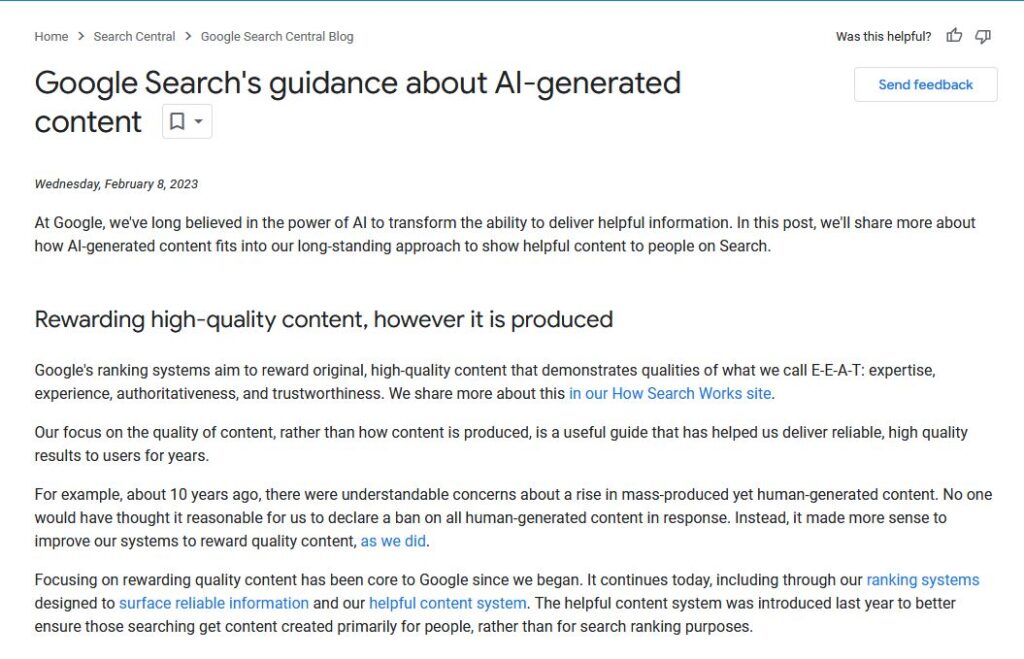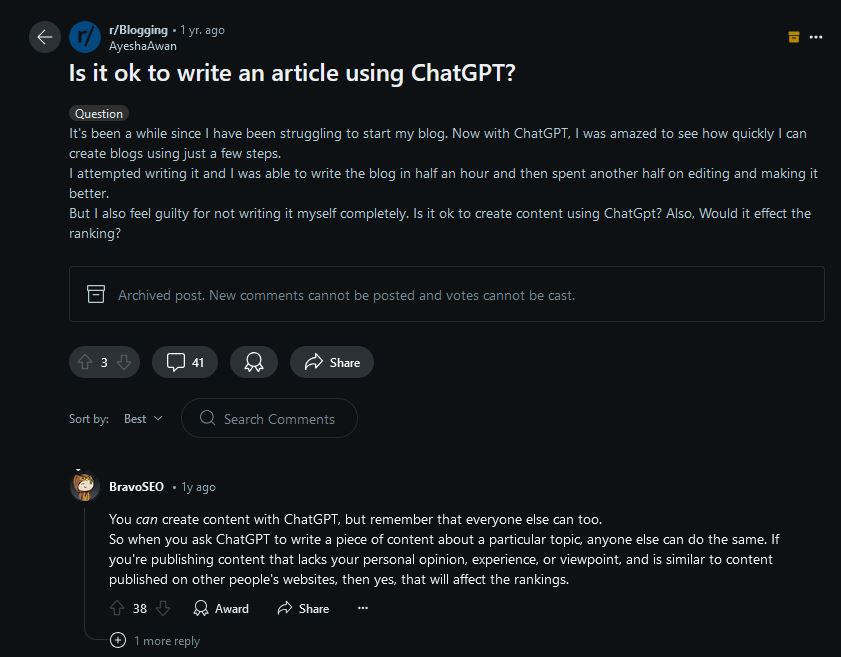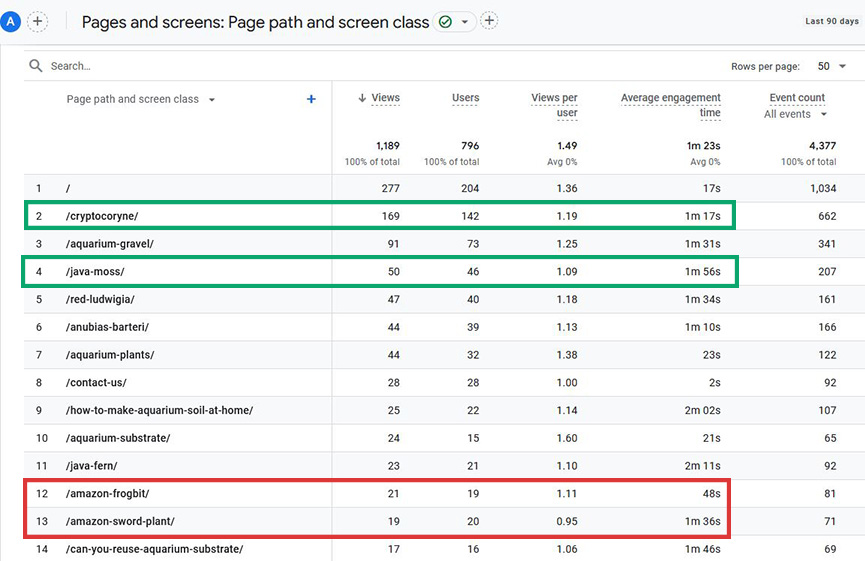You’ve started looking into SEO for your website but not being a writer you consider AI blog posts to start.
But, as your repository of AI generated written work builds, you check your analytics, and your traffic isn’t growing like you thought.
You start to think to yourself;
“Can you really use these tools to make AI blog posts and rank on Google in 2024?”
Or was it too good to be true?
If this has crossed your mind, don’t worry. In this article we will answer just that and more. Strap in your marketing seat belt. And let’s get into it.
Don’t forget if you’d like help writing your blog posts, white-papers, and PDFs our human creative team can help. Send us a message here anytime.
What’s The Verdict on AI Blogs? Use it Sparingly & Strategically
Google’s latest policies on AI generated content for search results state that it rewards ”high-quality content, however it is produced”.
They also go on to say that if users focus on:
”The quality of content, rather than how the content is produced”, they will generally be fine.

But like many things with Google this all seems so intentionally vague.
To be sure if using AI in your blogs would work in an SEO context, we checked with the SEO experts on Reddit. Here are some of their thoughts as well.

The result?
Although Google may lead us to believe AI generated content is not totally bad for blogs, SEO specialists suggest otherwise.
In fact The main consensus was that blog writers should only use AI in their writing as an aid.
The experts also state that a wholly generated AI blog post would lack creativity and nuance. And ultimately make a human reader’s BS detector go off.
However, this does not mean you can’t use AI at all for blogging.
To use AI successfully in your blogging strategy, you must incorporate your AI-tools in a way which is undetectable for readers and Google.
Essentially, an example of this could be incorporating generative AI into your writing workflow instead. You could have your AI whip up a comprehensive blog outline, and fill in the blanks yourself later.
Our AI Blog Post Experiments were Penalized by Google
Heavily using AI to generate blog content with only a few prompts will be penalized by Google. At least, as of the time of writing this. How do we know?
Well, we put it to the test!
Our client in the Aquarium niche saw a divergence when comparing their AI written vs non-AI written blogs.
Here’s their organic Google traffic over 90 days.

These URLs represent aquarium plants which aquarists would like to learn more information on to keep them thriving in their fish tanks.
To test if using GPT-4 vs human written content worked better, we wrote 4 articles on a different plant with roughly the same search volume and page structure. The difference? Two were written by hand and the other two by GPT-4.
While surprisingly the GPT-4 articles did get indexed, they did not perform nearly as well as the human written content. Furthermore, the human made content kept them on the page for over a minute longer. It’s easy and tempting to take the LLM way out of creating your blogs these days, but the results speak for themselves. Heavily AI generated content IS penalized by Google. Not only is scrutinized by Google, but if you do not have that human touch you risk de-humanizing your brand’s online voice and potentially leading customers to your competitors.
Although AI hasn’t been around for a while, it still can give off robotic sounding sentences and words which tips people off. We believe the last thing you want to do is to be the only person in your industry known for using GPT blogs.
Sidenote – Do Not Use AI for YMYL Blog Topics
YMYL, or “Your Money or Your Life,” is a category of topics that Google algorithms heavily scrutinize due to their real-world impacts.
For example, if you’re writing about a topic that affects someone’s finances or health, it’s crucial to avoid using AI-generated content. Google considers these sensitive topics and research indicates that Google upholds the strictest safety standards and policies for them.
Therefore, we recommend only using human-written content for money, law, and health topics. YMYL topics are also notoriously difficult to rank for, so building trust with unique, valuable, and human-written content would be better in any case.
So, don’t take shortcuts and do not use AI if you’re within the YMYL niche.
Heavy AI Priming and Prompting is Required for Best Results with AI Blogging
Even if you do decide to use AI blog posts in a niche that’s not affecting your life, money, or heath, it’s critical you should prime your AI beforehand. Train your AI model on things such as your brand’s writing tone, your brand’s target audience, keywords, and brand backstory. Furthermore, even after training your AI, one should use sparingly or in a way that aids the human writer. This makes the content more enjoyable to read for visitor and more likely to trust your brand.
Using AI for blogging requires one to prepare the language model to achieve optimal results. This includes prompting of the AI system to make sure what it returns is content that has your brand’s unique voice and messaging. This is called priming and it helps the AI internalize the specific subject matter that resonates with your target visitor.
But as we said before, even after training your AI, we believe you should still use AI-generated content sparingly. And always make sure to add your human touch rather than to brute-force your way to an easy article.
This hybrid approach maintains a natural, authentic feel in blog posts, making them more engaging and trustworthy for visitors.
Final Thoughts on AI for Blogging
In conclusion, while AI can be a powerful tool for blogging,. AI should not replace the human touch, especially in certain sensitive or highly regulated niches.
To make the most of using AI blog posts without facing penalties from search engines, consider using it to enhance your productivity during specific phases of your writing workflow, such as the drafting, brainstorming, or promotional phase of your blog writing process.
We believe it’s crucial to maintain your unique brand voice and solely using AI will degrade the quality of your content for your customers. But in the case where you do want to use AI, we recommend using it very sparingly to ensure reliability of your content.
By using AI judiciously, you can enjoy the benefits of increased efficiency and creativity while maintaining the authenticity of your brand voice.

